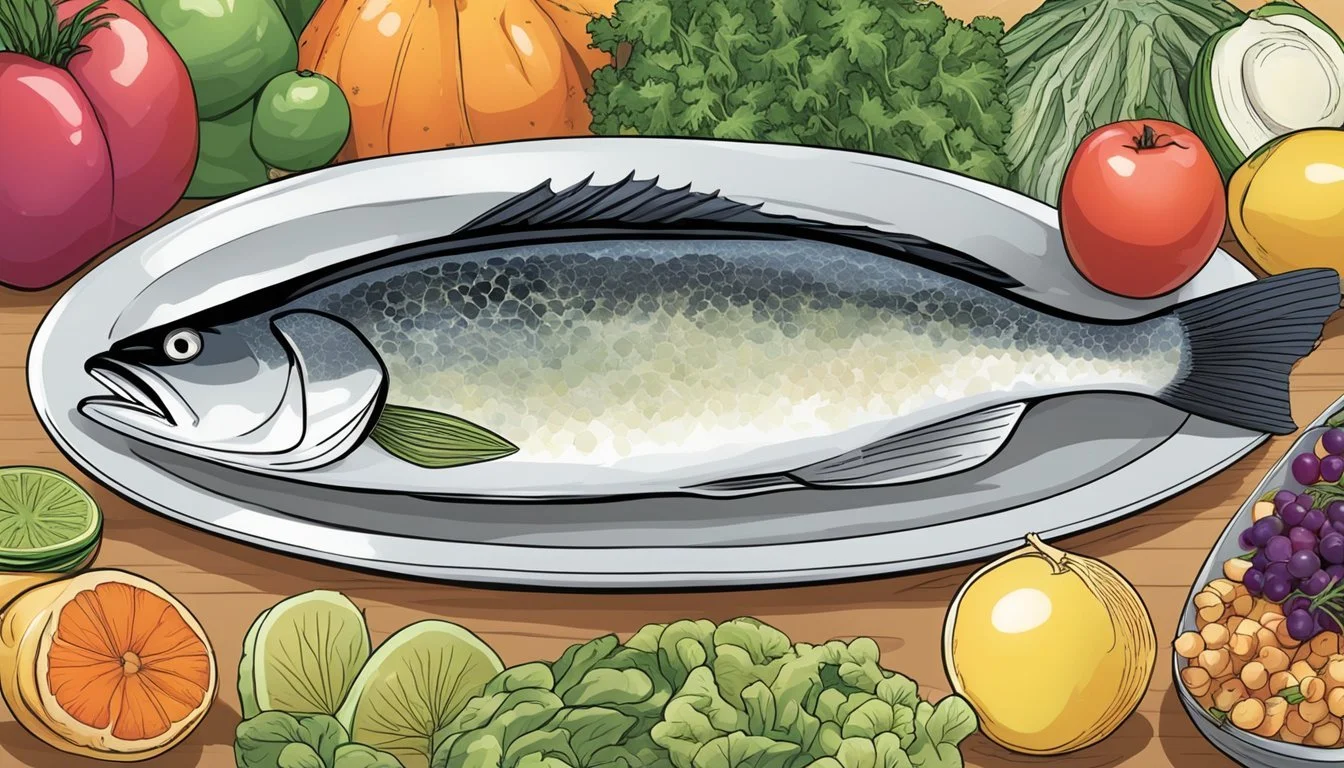Can Diabetics Eat Black Cod?
Nutritional Insights and Guidelines
Black cod, also known as sablefish, is a nutrient-dense seafood option that can be beneficial for individuals managing diabetes. Thanks to its low mercury levels, high protein content, and healthy fats, black cod is a smart choice for maintaining balanced blood sugar levels. Rich in omega-3 fatty acids, this fish helps improve insulin sensitivity, which is crucial for diabetes management.
In addition to its direct benefits for blood glucose control, black cod is low in saturated fat and can support heart health, an important consideration for diabetics. It can be prepared in various healthy ways, such as baking or grilling, without the need for added oils or fats. This makes it an easy option to incorporate into a diabetes-friendly diet.
Research suggests that including seafood like black cod in your diet not only aids in blood sugar management but also offers advantages such as lowering blood pressure and supporting a healthy metabolism. For those looking to diversify their diet while keeping their diabetes under control, black cod presents a delicious and healthful option.
Understanding Black Cod
Black cod is a nutrient-rich fish favored for its health benefits, including its high protein and omega-3 fatty acid content. It stands out for its beneficial impact on heart health, skin, and overall nutrition.
Nutritional Profile
Black cod, also known as sablefish, is renowned for its high nutritional value. It offers an excellent source of protein, vital for muscle growth and repair. The fish is rich in omega-3 fatty acids, specifically EPA and DHA, which support cardiovascular health and reduce inflammation.
In addition to omega-3s, black cod contains essential vitamins and minerals. Notable ones include vitamin D, which is crucial for bone health, and vitamin B12, important for nerve function. Minerals such as selenium and calcium are present, contributing to immune function and bone health, respectively.
Comparison with Other Fish
When compared to other fish, black cod's nutritional profile is impressive. For instance, it has higher levels of omega-3 fatty acids than many other species, making it more beneficial for heart health.
Salmon and trout, while also rich in omega-3s, contain fewer vitamins and minerals in comparison to black cod. Tuna, another popular choice, generally has lower omega-3 content and can contain higher mercury levels, which black cod is low in. This makes black cod a safer choice for regular consumption.
Health Benefits
The health benefits of black cod are numerous. Its high omega-3 content supports heart health by lowering blood pressure and reducing cholesterol levels. Omega-3s also promote healthy skin and eyes, combatting dryness and inflammation.
The protein in black cod helps with muscle repair and growth, which is beneficial for those who are physically active. Additionally, the fish’s magnesium content improves nerve function and muscle coordination. It is also low in calories and fat, making it a fantastic option for individuals managing their weight or looking to maintain a balanced diet.
Diabetes and Diet
For individuals with diabetes, maintaining balanced blood sugar levels and proper insulin function is crucial. A diet rich in nutrients, including various types of seafood, helps to manage these aspects effectively.
Role of Seafood in Diabetes
Seafood provides essential nutrients that benefit people with diabetes. Fish like salmon, sardines, and black cod are rich in omega-3 fatty acids, which aid in reducing inflammation and improving insulin sensitivity. These nutrients play a significant role in glycemic control.
Black cod is particularly noted for its high content of healthy fats and protein, both crucial for sustained energy and blood sugar regulation. The low carbohydrate content makes it an excellent dietary choice for diabetes management.
Managing Blood Sugar Levels
Meal planning for diabetes involves careful selection of foods to maintain steady blood sugar levels. Incorporating seafood like black cod, which is low in carbohydrates, helps to avoid spikes in blood sugar.
Lean proteins and healthy fats in seafood provide satiety, reducing the need for carb-heavy snacks. Consistent glycemic control minimizes the risk of heart disease and other complications related to diabetes.
Dietary Fats and Diabetes
The type of fat consumed significantly impacts diabetes management. Healthy fats, such as those found in black cod and other fatty fish, improve insulin sensitivity and support heart health.
Saturated fats, found in processed foods, can have adverse effects on cholesterol levels, leading to increased risk of heart disease. Replacing these with unsaturated fats from fish contributes positively to overall metabolic health.
Proper dietary choices, including the integration of omega-3 rich seafood, are key to managing diabetes effectively.
Risks and Considerations
When consuming black cod, it's essential to weigh potential risks such as mercury exposure, environmental concerns, and allergies. Understanding these factors can help individuals make informed dietary choices.
Mercury Content and Exposure
Black cod, like many seafood options, can contain varying levels of mercury. Mercury is a heavy metal that can accumulate in fish and pose health risks, especially to pregnant women and young children. Although black cod generally has lower mercury levels compared to larger fish such as swordfish and tuna, it is still prudent to monitor intake.
Excessive mercury consumption can lead to neurological and developmental issues. The FDA provides guidelines on safe fish consumption to minimize mercury exposure. For diabetics, adhering to these guidelines ensures that their diet remains both safe and nutritious.
Sustainability and Environmental Impact
The sustainability of seafood is a growing concern for environmentally conscious consumers. Black cod populations are subject to overfishing, which can threaten the species and disrupt marine ecosystems. Sustainable seafood practices, such as selecting fish from well-managed fisheries, are crucial in preserving marine biodiversity.
Organizations like the Marine Stewardship Council (MSC) certify fisheries that adhere to sustainable practices. Checking for MSC certification or similar labels can help consumers choose black cod that is responsibly sourced, minimizing environmental impact.
Allergy and Intolerance Concerns
Seafood allergies are relatively common and can cause severe reactions in some individuals. Black cod, as with other types of fish, can trigger allergic responses ranging from mild symptoms like hives to severe anaphylactic reactions. Individuals with known fish allergies should avoid black cod and other seafood to prevent adverse effects.
Additionally, some people might experience intolerance to certain proteins found in black cod. Symptoms can include digestive issues such as bloating and discomfort. Consulting with a healthcare provider is advisable for those who suspect they have a seafood allergy or intolerance.
Preparing Black Cod
Black cod, also known as sablefish, is a versatile and rich seafood option. It offers a variety of health benefits and can be prepared through different cooking techniques such as grilling, baking, and broiling.
Selecting and Purchasing Tips
When purchasing black cod, look for fresh or frozen fillets that are firm and moist. Fresh black cod should have a slight sheen and a mild, clean smell with no fishy odor.
Frozen options are also good as they retain nutrients well. They should be free from freezer burn or ice crystals. Inspect the packaging for any damage or signs of defrosting and refreezing.
For the best flavor, choose wild-caught black cod sourced from sustainable fisheries. Check labels or ask your fishmonger regarding the source and freshness.
Cooking Techniques
Black cod is rich in healthy fats, making it forgiving to cook with a range of methods. Baking is straightforward and can be done by preheating your oven to 425°F, then baking fillets for about 10-12 minutes.
Grilling black cod is best done skin-side down on a hot grill, allowing the skin to become crispy. This usually takes 4-5 minutes on medium heat.
Sautéing involves cooking the fish in a hot pan with olive oil and garlic cloves for added flavor. Broiling uses high heat to create a nice crust, while poaching provides a moist and gentle cooking method.
Recipe Ideas
For a simple and delicious recipe, try baking black cod with olive oil, lemon juice, and garlic cloves. Sprinkle some salt and pepper over the fillets, and bake until the fish is opaque and flakes easily with a fork.
Another idea is a honey and soy-glazed sablefish, which uses a marinade of soy sauce, honey, and balsamic vinegar. This can be broiled for a few minutes to caramelize the glaze.
For a one-pan option, roast black cod with cherry tomatoes and capers. Drizzle with olive oil, season, and bake until the fish is cooked through. This method not only cooks the fish but also blends the flavors of the additional ingredients well.
Incorporating Black Cod into a Diabetic Diet
When incorporating Black Cod into a diabetic diet, consider portion control and frequency, balancing macronutrients, and suitable food pairings.
Portion Control and Frequency
It's important for diabetics to control the portion size of Black Cod to manage calorie and nutrient intake. Aim for a serving size of about 3-4 ounces, similar to the size of a deck of cards. This ensures that the meal is nutrient-dense yet calorically appropriate.
Consuming Black Cod about 1-2 times per week can offer a good balance of nutrients without overloading the diet with fish. Regular intake can help sustain the benefits of omega-3 and lean protein without excesses.
Balancing Macronutrients
Black Cod is an excellent source of lean protein and healthy fats, particularly omega-3 fatty acids. For diabetics, it's crucial to balance these macronutrients with carbohydrates and fibers.
Pair Black Cod with complex carbohydrates like quinoa or brown rice. This ensures a slow release of glucose into the bloodstream. Moreover, the inclusion of fiber-rich vegetables such as broccoli, spinach, or asparagus can help maintain stable blood sugar levels.
Accompanying Foods and Pairings
When planning a meal with Black Cod, choose foods that complement its nutritional profile. For instance, serving Black Cod with a side of steamed broccoli or grilled asparagus adds valuable vitamins and minerals.
Consider using healthy cooking methods like grilling, baking, or poaching to preserve the fish's nutritional content. Adding a squeeze of lemon or a sprinkle of fresh herbs can enhance the flavor without adding unnecessary calories or sugars.
A balanced meal might include Black Cod with a side of quinoa and a mix of leafy greens for a nutrient-rich option that supports diabetic health.
Health Benefits and Nutrients
Black cod provides numerous health benefits due to its rich nutritional profile. It is especially known for promoting cardiovascular health, reducing inflammation, and supporting bone and immune health.
Cardiovascular Health
Black cod is packed with omega-3 fatty acids, including DHA and EPA, which are highly beneficial for heart health. These fats help reduce the risk of heart disease and stroke by lowering blood pressure and improving cholesterol levels. According to the American Heart Association (AHA), consuming fish high in omega-3s can significantly contribute to cardiovascular health.
Anti-inflammatory Properties
The omega-3 fatty acids in black cod also possess potent anti-inflammatory properties. This helps reduce inflammation throughout the body, which can alleviate symptoms of joint health issues such as arthritis. Additionally, omega-3s may reduce chronic inflammation, potentially lowering the risk of diseases linked to long-term inflammation.
Bone and Immune Support
Black cod is an excellent source of essential nutrients that support both bone health and the immune system. It contains important vitamins and minerals that strengthen bones and enhance immune function. Magnesium, another key nutrient in black cod, plays a critical role in muscle and nerve function, further promoting overall health.
Nutritional Guidelines for Diabetics
Diabetics need to carefully manage their diet to maintain blood sugar levels, heart health, and overall well-being. This section details recommended intake, sodium and sugar considerations, and expert opinions and studies.
Recommended Intake
People with diabetes are advised to focus on low-calorie, high-protein foods that aid in glycemic control. Cod and other white fish like tilapia are excellent choices due to their high protein content (32.6 g per small fillet) and low saturated fat.
Non-starchy vegetables and healthy fats such as those found in fish are also recommended. The American Heart Association suggests including omega-3 fatty acids which can help manage LDL cholesterol levels. Diabetics should aim for a balanced diet that incorporates these elements.
Sodium and Sugar Considerations
Managing sodium and sugar intake is crucial for diabetics. Consuming high levels of sodium can raise blood pressure, which is dangerous for those with diabetes-related cardiovascular risks. The FDA advises adults to limit sodium intake to 2,300 mg per day, but less is better, particularly for diabetics.
The same goes for sugar; reducing sugar intake aids in maintaining optimal blood glucose levels. People with diabetes should carefully read nutritional labels and monitor portion sizes to keep their carbohydrate intake within the recommended limits.
Expert Opinions and Studies
Research supports consuming fish like cod for its benefits in diabetic diets. Studies have shown that fish consumption can improve glycemic control and reduce cardiovascular risks. A study published in the American Journal of Clinical Nutrition highlights the significance of incorporating fish into a diabetic diet.
Additional recommendations from the American Diabetes Association underline the importance of including various forms of protein like fish, poultry, and legumes to achieve a well-rounded, nutritious diet. These guidelines can help diabetics manage their condition more effectively while enjoying a diverse range of foods.






